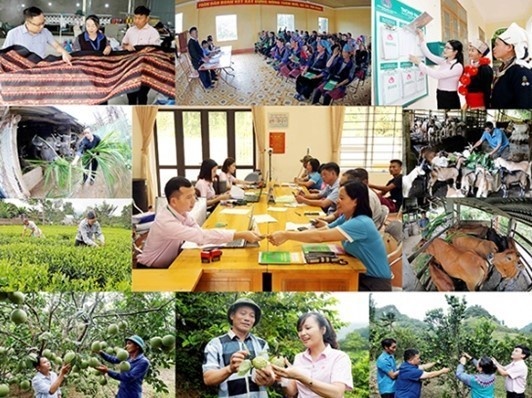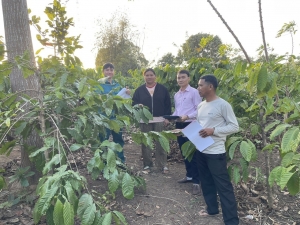Improving the effectiveness of social policy credit
 |
On behalf of the Party Central Secretariat, on October 30, Standing Member of the Party Secretariat Tran Cam Tu signed a directive to improve the efficiency of social policy credit.
Over the 10 years of implementing a directive issued in November 2014 by the Secretariat of the 11th Party Central Committee on strengthening the Party's leadership over social policy credit, social policy credit has achieved many important results. This helps raise the awareness of Party organisations, authorities, the Vietnam Fatherland Front, socio-political organisations, cadres, Party members and people about the important role of social policy credit. It results in unity in action to create a synergy of strength for the whole political system in the implementation of social policy credit.
In addition, laws and policies on social policy credit have been completed in a more synchronous direction, creating more favourable conditions for social policy credit activities. In particular, the preferential credit policy has been delivered in a timely manner to support those facing difficulties due to the Covid-19 pandemic. Social policy credit has grown tremendously with a stable growth rate over the years. All provincial and district-level localities have paid attention to balancing and allocating a part of the local budget entrusted through Vietnam Bank for Social Policies (VBSP) to supplement loan capital.
At the same time, social policy capital is deployed to all communes, wards, and townships in the country. The quality of social policy credit has been improved, while the ratio of overdue and frozen debts has been maintained at a low level. The Vietnam Fatherland Front and socio-political organisations have strengthened propaganda, social supervision, and criticism in the implementation of social policy credit while implementing entrustment activities effectively. The operation and model of VBSP have been reinforced.
In particular, social policy credit has made significant contributions to socioeconomic development with rapid and sustainable poverty reduction, new rural construction, and job creation. At the same time, it also helps improve the quality of human resources, ensure social security, and narrow the gap between rich and poor across regions. Other important achievements include strengthening national defence, maintaining national security, ensuring socio-political stability, meeting the aspirations of the people, and enhancing the people's trust in the Party and the state. This is one of the pillars of the system of social security policies, demonstrating the superiority of the socialist regime.
Despite achievements, social policy credit still has numerous limitations, difficulties, and obstacles. There is a lack of diversity in capital sources to meet actual needs.
A small proportion of all capital sources come from philanthropic sources, entrusted capital in some localities, and other legal capital sources. Credit efficiency in some regions and localities is still low, while the rate of overdue debts is high. The investment scale is still modest, household-based, and unrelated to the model and chain-linked projects with a shortage of steady and long-term support for consumption. VBSP's digital transformation is still in its early stages.
Less attention was paid to the leadership and implementation among regulatory bodies. This is coupled with a lack of coordination in the formulation, dissemination, and implementation of policies. It has yet to link between goals and the ability to meet financial resources.
With the centralised administration mechanism, the integration of social policy credit into socioeconomic development programmes remains inconsistent. A number of national policies are not appropriate for every subject, area, and location. There are no specific regulations on the ratio and principles for determining the main source of capital, in accordance with the characteristics of social policy credit. Meanwhile, policies are not really suitable for VBSP to access official development assistance and concessional loans from the government.
Notably, many socioeconomic development goals must be implemented simultaneously against the backdrop of limited state resources. Challenges are heightened by the negative impacts of climate change, natural disasters, and the Covid-19 pandemic.
It is vital to improve the efficiency of social policy credit amidst the complex and unpredictable traditional and non-traditional security factors and the government’s goal to become a high-income country by 2045. The Secretariat requests all levels of Party committees, organisations, administrations, the Vietnam Fatherland Front, and socio-political organisations to seriously and effectively implement the following main tasks.
Firstly, to strengthen leadership, direct the dissemination of information, and implement the policies and laws on social policy credit, raising the awareness of the position and role of social policy credit.
Secondly, to enhance the role of Party committees, organisations, authorities, the Vietnam Fatherland Front, and socio-political organisations in social policy credit.
Thirdly, to complete social policy credit policies in the inclusive and sustainable direction in line with the 10-year socioeconomic development strategy 2021–2030, the 5-year socioeconomic development strategy 2026-2030, the national financial inclusion strategy through 2025, with orientations towards 2030, and the VBSP development strategy to 2030 and national target programmes.
Fourthly, to prioritise resources and diversify capital mobilisation channels to implement social policy credit programmes, ensure that operating capital is allocated in the medium term and annual public investment plans for VBSP.
Fifthly, to develop VBSP as a public financial institution with autonomy and non-profit operation. By implementing the State's socioeconomic policies, VBSP focuses on areas that other financial institutions operating according to market principles cannot meet or only partially meet.
Sixth, to research specific policies to promote the policy credit model, especially the participation of the community, social enterprises, and non-profit enterprises. To encourage the development of digital platforms for policy credit and effectively control black credit.
 | Policy credit has been the catalyst for poverty reduction in Gia Lai In the past decade, nearly $20 billion in policy credit from Vietnam Bank for Social Policies (VBSP) in Chu Se district in Gia Lai province has supported needy households and other policy beneficiaries, sparking spectacular changes in the plateau. |
 | Vietnam Bank for Social Policies scales up support in aftermath of Typhoon Yagi Vietnam Bank for Social Policies (VBSP) has announced it will suspend interest payments for borrowers affected by Typhoon Yagi and the subsequent flooding until December 31. |
 | Policy credit a boon to Yen Bai residents in the wake of Typhoon Yagi Yen Bai province suffered some of the most significant damage from Typhoon Yagi in September, with heavy rainfall and floods. In response, Vietnam Bank for Social Policies (VBSP) has stepped up the pace of policy credit allocation to affected areas in the locality. |
What the stars mean:
★ Poor ★ ★ Promising ★★★ Good ★★★★ Very good ★★★★★ Exceptional
Related Contents
Latest News
More News
- Cashless payments hit 28 times GDP in 2025 (February 04, 2026 | 18:09)
- SSIAM and DBJ launch Japan Vietnam Capital Fund (February 04, 2026 | 15:57)
- Banks target stronger profits, credit growth in 2026 (February 04, 2026 | 15:43)
- Vietnam on path to investment-grade rating (February 03, 2026 | 13:07)
- Consumer finance sector posts sharp profit growth (February 03, 2026 | 13:05)
- Insurance market building the next chapter of protection (February 02, 2026 | 11:16)
- NAB Innovation Centre underscores Vietnam’s appeal for tech investment (January 30, 2026 | 11:16)
- Vietnam strengthens public debt management with World Bank and IMF (January 30, 2026 | 11:00)
- Corporate bond market poised for stronger growth cycle (January 28, 2026 | 17:13)
- Vietnam's IPO market on recovery trajectory (January 28, 2026 | 17:04)

 Tag:
Tag:




















 Mobile Version
Mobile Version